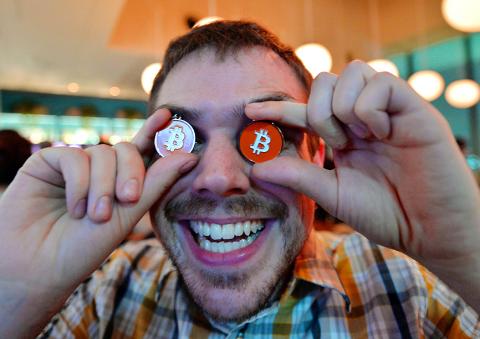Vietnam has banned its banks from handling bitcoins, saying the virtual currency is not legal tender in the communist nation.
Bitcoin, invented in the wake of the global financial crisis, is a form of cryptography-based e-money that offers a largely anonymous payment system, but its value is highly volatile.
“The ownership, trading and use of bitcoin and other virtual money as an asset carries potential risks for users,” the State Bank of Vietnam said in a statement on Thursday.

Photo: AFP
It warned against investing in bitcoin or processing transactions using the crypto-currency, saying it was forced to act after seeing a rise in its use on “some trading floors.”
The currency is not widely used in Vietnam, but the bitcoin investor community is reported to be expanding rapidly.
“Since people believe bitcoin would become more valuable in the future, they tend to hoard bitcoins as they hoard gold,” Le Huy Hoa, a member of a bitcoin forum in Vietnam, was quoted as saying by the VietnamNet news Web site.
The world’s bitcoin community was shaken on Tuesday by the disappearance of its biggest exchange, Japan-based MtGox. In Tokyo on Thursday night, investors were calling for a legal probe and possible criminal action against the chief executive of the embattled MtGox, Mark Karpeles.
Japan’s finance minister said yesterday he always thought Bitcoin was suspect and said the country might take action, while US Federal Reserve Chair Janet Yellen said the US central bank had no powers to control the unit, which she said would be very difficult to regulate.
Bitcoin’s rollercoaster week showed signs of settling down yesterday, trading around US$567 at 5:45am, down about 1.3 percent for 24 hours, according to the Coindesk index.
In Vietnam, a bitcoin was trading at roughly 6 million Vietnamese dong (US$300) this week, down from about US$1,000 last month, according to VietnamNet.
Some other countries, including Russia and China, have heavily restricted how bitcoins can be used.

KEEPING UP: The acquisition of a cleanroom in Taiwan would enable Micron to increase production in a market where demand continues to outpace supply, a Micron official said Micron Technology Inc has signed a letter of intent to buy a fabrication site in Taiwan from Powerchip Semiconductor Manufacturing Corp (力積電) for US$1.8 billion to expand its production of memory chips. Micron would take control of the P5 site in Miaoli County’s Tongluo Township (銅鑼) and plans to ramp up DRAM production in phases after the transaction closes in the second quarter, the company said in a statement on Saturday. The acquisition includes an existing 12 inch fab cleanroom of 27,871m2 and would further position Micron to address growing global demand for memory solutions, the company said. Micron expects the transaction to

Nvidia Corp’s GB300 platform is expected to account for 70 to 80 percent of global artificial intelligence (AI) server rack shipments this year, while adoption of its next-generation Vera Rubin 200 platform is to gradually gain momentum after the third quarter of the year, TrendForce Corp (集邦科技) said. Servers based on Nvidia’s GB300 chips entered mass production last quarter and they are expected to become the mainstay models for Taiwanese server manufacturers this year, Trendforce analyst Frank Kung (龔明德) said in an interview. This year is expected to be a breakout year for AI servers based on a variety of chips, as

Global semiconductor stocks advanced yesterday, as comments by Nvidia Corp chief executive officer Jensen Huang (黃仁勳) at Davos, Switzerland, helped reinforce investor enthusiasm for artificial intelligence (AI). Samsung Electronics Co gained as much as 5 percent to an all-time high, helping drive South Korea’s benchmark KOSPI above 5,000 for the first time. That came after the Philadelphia Semiconductor Index rose more than 3 percent to a fresh record on Wednesday, with a boost from Nvidia. The gains came amid broad risk-on trade after US President Donald Trump withdrew his threat of tariffs on some European nations over backing for Greenland. Huang further

HSBC Bank Taiwan Ltd (匯豐台灣商銀) and the Taiwan High Prosecutors Office recently signed a memorandum of understanding (MOU) to enhance cooperation on the suspicious transaction analysis mechanism. This landmark agreement makes HSBC the first foreign bank in Taiwan to establish such a partnership with the High Prosecutors Office, underscoring its commitment to active anti-fraud initiatives, financial inclusion, and the “Treating Customers Fairly” principle. Through this deep public-private collaboration, both parties aim to co-create a secure financial ecosystem via early warning detection and precise fraud prevention technologies. At the signing ceremony, HSBC Taiwan CEO and head of banking Adam Chen (陳志堅)